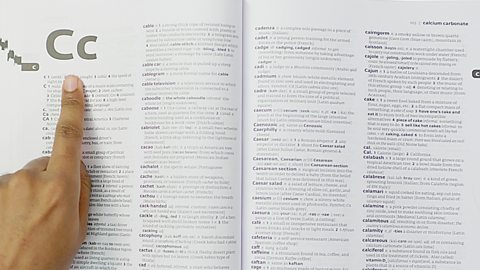What do you know?
What does a Duchess have in common with an introduction and a bus conductor?
Duchess, introduction and conductor all share the same Latin root word – ducere meaning ‘to lead’.
Introduction to understanding root words
Words did not spring out of nowhere – the language we use has developed throughout history and the words you use come from many different places around the world.
With a little knowledge you can work out the meaning of words you have never seen before. All you need to do is identify the parts of the word.
Key learning points
- Find out what a root word is and how to identify the parts of a word.
- Work out the meaning of new vocabulary using the building blocks of words.
- See how root words can help your spelling.
Video about understanding root words
Video about root words and how their meaning can change if you add a suffix or a prefix or even both
Root words are words that can grow and transform into new words.
Sometimes they can sprout an extra part at the end.
This is called a suffix.
Different suffixes change words and their meanings. By adding the word ‘less’, which means to take away, root can become rootless.
At other times, we can add an extra bit at the beginning this is called a prefix. So, uproot means to pull up. The word changes meaning.
And sometimes, root words can grow at both ends, with a prefix and a suffix.
Each time the root word grows, the meaning changes again. Sometimes it can change a word from present tense to past tense.
By knowing what a root word means, you can uncover the meaning of a longer word.
Look at the different parts of the word, to work out its meaning.
Discoverable.
And it can help with spelling too. When you know how to spell a root word, you can also work out how to spell words that grow from it.
So, all in all, root words can be a voyage of discovery!
Explaining root words
What is a root word?
Just like shoots and leaves grow from the root of a plant, a root word is a word from which other words can grow.
To use another analogy, a root word is one of the building blocks that make up a word. Its basic meaning is the same no matter where you find it.
Sometimes the root can be used on its own as a word in itself, for example: meter, legal, act, norm.
Building on a root word
A root word can be built upon, and bits added to make a new word.
Usually, we make these new words by adding a prefix or suffix to the root.
A prefix goes before the root; a suffix goes after.
Have a look at the table below. The root words ‘act’ and ‘norm’ can be used on their own. But look what happens when you add a prefix or suffix.
| prefix | root | suffix |
|---|---|---|
| act | -ed | |
| act | -ion | |
| in- | act | -ive |
| para- | norm | -al |
| ab- | norm | -al |
Using root words to understand new vocabulary
Morphology
The suffix ‘ology’ means the study of something. ‘Morph’ means shape. Morphology, therefore, is the study of the shape of things. In linguisticsLinguistics is the scientific study of all human languages and their structures., morphology is the study of the shape of words.
Using morphology can help you to work out the meaning of vocabulary that's new to you.
Common prefixes and suffixes
The prefix will always be at the front of the word and gives you a clue about the meaning of a word.
- In- or un- or ir- means ‘not’ – used in inactive, insensitive, unpopular, irregular
- Mal- means ‘ill or bad’ – used in maladjusted, malevolent
- Re- means ‘against or back’ – used in revise, reconsider
- Inter- means ‘between’ – used in international, intervene
- Omni- means ‘all’ – used in omniscient, omnipresent
- Dis- means ‘badly or not’ – used in disappointed, dismay, disengaged
- Syn- or sym- or com- or con- all mean ‘together’ – used in symbolism, synergy, symbiotic, complete, control
The suffix will always be at the end of the word.
- -able, -ible means ‘can be done’ – used in comfortable
- -ion, -tion means an act or process – used in occasion, attraction
- -ty means a state of – used in infinity, unity
- -ous, -eous, -ious means possessing the qualities of – used in piteous, joyous, vicious
Common Latin root words
Here are some examples of root words that can unlock some tricky vocabulary.
- Patho- means pain or to suffer. This is seen in words such as empathy, sympathy, neuropathy. Look for: path-, pathy-
- Tenere- means to hold or stretch. This is seen in words such as tenacity, contend, intend, tenure. Look for: ten-, tain-
- Poly- means to fill, be numerous. This is seen in words such as polymer, polygon, deplete, accomplish. Look for: pli-, ple-, poly-
Spelling tips for suffixes
-Ance or -ence?
The suffix -ence or -ance or -ent indicates a state of being, for example conscience.
- To work out which one to use, listen to the last sound of the root word.
- If it is ‘t’, ‘k’, or ‘g’ (all hard sounds) then it’s usually spelled -ance for example elegance, instance.
- When the last sound of the root word is ‘s’ or ‘sh’ then it’s usually spelled -ence for example patience, efficient, proficiency.
-Ible or -able?
- -ible usually comes at the end of an unfinished root word for example audible, eligible, edible:
- aud – ible
- elig – ible
- poss – ible
- aud, elig, and poss are not complete words
- -able usually comes at the end of a complete root word for example payable, readable, adaptable:
- read – able
- pay – able
- adapt – able
- read, pay and adapt are all complete words
Test your knowledge
Play Bitesize secondary games. gamePlay Bitesize secondary games
Have fun playing science, maths, history, geography and language games.

More on Spelling
Find out more by working through a topic
- count2 of 5

- count3 of 5

- count4 of 5

- count5 of 5
